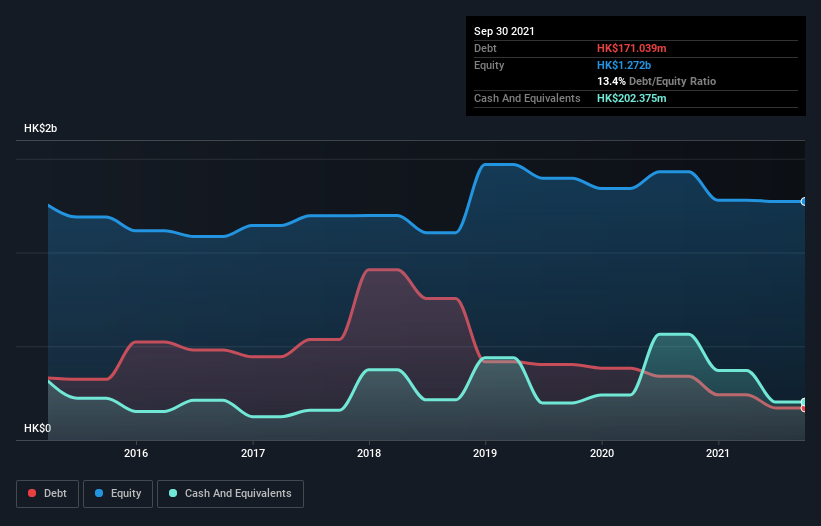- Hong Kong
- /
- Real Estate
- /
- SEHK:2288
Rykadan Capital (HKG:2288) Has Debt But No Earnings; Should You Worry?
Legendary fund manager Li Lu (who Charlie Munger backed) once said, 'The biggest investment risk is not the volatility of prices, but whether you will suffer a permanent loss of capital.' When we think about how risky a company is, we always like to look at its use of debt, since debt overload can lead to ruin. We can see that Rykadan Capital Limited (HKG:2288) does use debt in its business. But the real question is whether this debt is making the company risky.
What Risk Does Debt Bring?
Debt and other liabilities become risky for a business when it cannot easily fulfill those obligations, either with free cash flow or by raising capital at an attractive price. Part and parcel of capitalism is the process of 'creative destruction' where failed businesses are mercilessly liquidated by their bankers. However, a more common (but still painful) scenario is that it has to raise new equity capital at a low price, thus permanently diluting shareholders. Of course, plenty of companies use debt to fund growth, without any negative consequences. The first thing to do when considering how much debt a business uses is to look at its cash and debt together.
See our latest analysis for Rykadan Capital
What Is Rykadan Capital's Net Debt?
As you can see below, Rykadan Capital had HK$171.0m of debt at September 2021, down from HK$339.6m a year prior. However, its balance sheet shows it holds HK$202.4m in cash, so it actually has HK$31.3m net cash.

How Healthy Is Rykadan Capital's Balance Sheet?
According to the balance sheet data, Rykadan Capital had liabilities of HK$206.9m due within 12 months, but no longer term liabilities. Offsetting this, it had HK$202.4m in cash and HK$82.1m in receivables that were due within 12 months. So it actually has HK$77.5m more liquid assets than total liabilities.
This surplus liquidity suggests that Rykadan Capital's balance sheet could take a hit just as well as Homer Simpson's head can take a punch. Having regard to this fact, we think its balance sheet is as strong as an ox. Simply put, the fact that Rykadan Capital has more cash than debt is arguably a good indication that it can manage its debt safely. When analysing debt levels, the balance sheet is the obvious place to start. But it is Rykadan Capital's earnings that will influence how the balance sheet holds up in the future. So if you're keen to discover more about its earnings, it might be worth checking out this graph of its long term earnings trend.
Over 12 months, Rykadan Capital made a loss at the EBIT level, and saw its revenue drop to HK$90m, which is a fall of 59%. That makes us nervous, to say the least.
So How Risky Is Rykadan Capital?
By their very nature companies that are losing money are more risky than those with a long history of profitability. And we do note that Rykadan Capital had an earnings before interest and tax (EBIT) loss, over the last year. And over the same period it saw negative free cash outflow of HK$67m and booked a HK$22m accounting loss. With only HK$31.3m on the balance sheet, it would appear that its going to need to raise capital again soon. Even though its balance sheet seems sufficiently liquid, debt always makes us a little nervous if a company doesn't produce free cash flow regularly. There's no doubt that we learn most about debt from the balance sheet. However, not all investment risk resides within the balance sheet - far from it. For example, we've discovered 3 warning signs for Rykadan Capital (1 is a bit concerning!) that you should be aware of before investing here.
When all is said and done, sometimes its easier to focus on companies that don't even need debt. Readers can access a list of growth stocks with zero net debt 100% free, right now.
New: AI Stock Screener & Alerts
Our new AI Stock Screener scans the market every day to uncover opportunities.
• Dividend Powerhouses (3%+ Yield)
• Undervalued Small Caps with Insider Buying
• High growth Tech and AI Companies
Or build your own from over 50 metrics.
Have feedback on this article? Concerned about the content? Get in touch with us directly. Alternatively, email editorial-team (at) simplywallst.com.
This article by Simply Wall St is general in nature. We provide commentary based on historical data and analyst forecasts only using an unbiased methodology and our articles are not intended to be financial advice. It does not constitute a recommendation to buy or sell any stock, and does not take account of your objectives, or your financial situation. We aim to bring you long-term focused analysis driven by fundamental data. Note that our analysis may not factor in the latest price-sensitive company announcements or qualitative material. Simply Wall St has no position in any stocks mentioned.
About SEHK:2288
Rykadan Capital
An investment holding company, engages in the property development business in Hong Kong and the United States.
Excellent balance sheet with low risk.
Market Insights
Community Narratives



